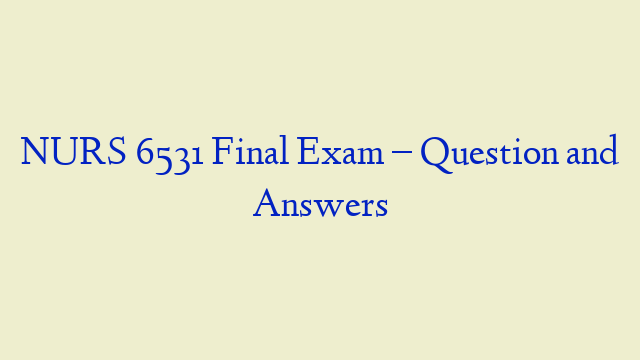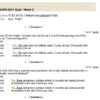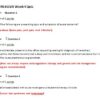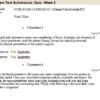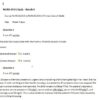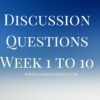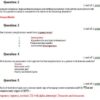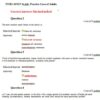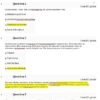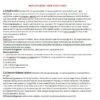Description
NURS 6531 Final Exam
- In the outpatient office setting, the most common reason for a malpractice suit is failure to:
- Reed-Sternberg B lymphocytes are associated with one of the following disorders:
- The initial clinical sign of Dupuytren’s contracture is:
- Marsha presents with symptoms resembling both fibromyalgia and chronic fatigue syndrome, which have many similarities. Which of the following is more characteristic of fibromyalgia?
- A child with type 1 diabetes mellitus has experienced excessive hunger, weight gain and increasing hyperglycemia. The Somogyi effect is suspected. What steps should be taken to diagnose and treat this condition?
- The 4 classic features of Parkinson’s disease are:
- What conditions must be met for you to bill “incident to” the physician, receiving 100% reimbursement from Medicare?
- The cornerstone of treatment for a stress fracture of the femur or metatarsal stress fracture is:
- Which of the following antibiotics should not be prescribed for a pregnant woman in the 3rd trimester?
- Which is the most common cause of end-stage renal disease in the United States?
- A typical description of a tension headache is:
- A patient taking levothyroxine is being over-replaced. What condition is he at risk for?
- Which of the following medications increase the risk for metabolic syndrome?
- You are assessing a patient after a sports injury to his right knee. You elicit a positive anterior/posterior drawer sign. This test indicates an injury to the:
- A middle-aged man presents to urgent care complaining of pain of the medial condyle of the lower humerus. The man works as a carpenter and describes a gradual onset of pain. On exam, the medial epicondyle is tender and pain is increased with flexion and pronation. Range of motion is full The most likely cause of this patient’s pain is:
- The organism most often associated with prostatitis is:
- Dave, age 38, states that he thinks he has an ear infection because he just flew back from a business trip and feels unusual pressure in his ear. You diagnose barotrauma. What is your next action?
- Maria, age 17, was raped when she was 13 year old. She is now experiencing sleeping problems, flashbacks, and depression. What is your initial diagnosis?
- What diabetic complications result from hyperglycemia?
- Prolonged PT suggests:
- The most reliable indicator(s) of neurological deficit when assessing a patient with acute low back pain is(are):
- A patient presenting for an annual physical exam has a BMI of 25 kg/m2 This patient would be classified as:
- Jennifer says that she has heard that caffeine can cause osteoporosis and asks you why. How do you respond?
- Jack, age 55, comes to the office with a blood pressure of 144/98 mm Hg. He states that he did not know if it was ever elevated before. When you retake his blood pressure at the end of the exam, it remains at 144/98. What should your next action be?
- Diagnostic radiological studies are indicated for low back pain:
- Risk factors for Addison’s disease include which of the following?
- A 32-year-old female patient presents with fever, chills, right flank pain, right costovertebral angle tenderness, and hematuria. Her urinalysis is positive for leukocytes and red blood cells. The nurse practitioner diagnoses pyelonephritis. The most appropriate management is:
- A patient has just been diagnosed with Bell’s palsy. He is understandably upset and has questions about the prognosis. You response should be:
- After treating a patient for Helicobacter pylori infection, what test do you order to see if it has been cured?
- A patient presents with dehydration, hypotension, and fever. Laboratory testing reveals hyponatremia, hyperkalemia, and hypoglycemia. These imbalances are corrected, but the patient returns 6 weeks later with the same symptoms of hyperpigmentation, weakness, anorexia, fatigue, and weight loss. What action(s) should the nurse practitioner take?
- The most common symptoms of transient ischemic attack (TIA) include:
- Which patient would benefit most from screening for type 2 diabetes?
- An obese hyperlipidemic patient, newly diagnosed with type 2 diabetes mellitus, has fasting glucose values 180 to 250 mg/Dl. What is the most appropriate initial treatment to consider?
- A 32-year-old male patient complains of urinary frequency and burning on urination for 3 days. Urinalysis reveals bacteriuria. He denies any past history of urinary tract infection. The initial treatment should be:
- The most reliable diagnostic indicator of gout is:
- A 60-year-old male patient with multiple health problems presents with a complaint of erectile dysfunction (ED). Of the following, which medication is most likely to be causing the problem?
- Diabetes screening recommendations for asymptomatic adults age 45 and over include which of the following:
- Diagnostic evaluation of hypothyroidism reveals:
- The most effective intervention(s) to prevent stroke is (are):
- Josh, age 22, is a stock boy and has an acute episode of low back pain. You order an NSAID and tell him which of the following?
- The cardinal sign of infectious arthritis is:
- Which appropriate test for the initial assessment of Alzheimer’s disease provides the performance ratings on 10 complex, higher-order activities?
- A patient exhibits extrapyramidal side effects of antipsychotic medications. Which of the following symptoms would lead you to look for another diagnosis?
- Urine cultures should be obtained for which of the following patients?
- A 65-year-old patient complains of recurrent bilateral temporal headaches, malaise, muscle aches, and low-grade fever. The headache is described as superficial tenderness rather than deep pain. Giant cell arteritis is suspected. Appropriate treatment is:
- Beth, age 49, comes in with low back pain. An x-ray of the lumbosacral spine is within normal limits. Which of the following diagnoses do you explore further?
- Martin, age 24, presents with an erythematous ear canal, pain, and a recent history of swimming. What do you suspect?
- Which history is commonly found in a patient with glomerulonephritis?
- A 27-year-old female patient with epilepsy is well controlled with phenytoin (Dilantin). She requests information about contraception. The nurse practitioner should instruct her that while taking phenytoin:
- Which of the following is a contraindication for metformin therapy?
- Microalbuminuria is a measure of:
- The best test to determine microalbuminuria to assist in the diagnosis of diabetic neuropathy:
- A nurse practitioner diagnoses a 60-year-old male with balanitis. Which disease is commonly associated with balanitis?
- A patient with HIV infection has a fever of unknown origin (FUO). Which of the following is a possible cause of FUO in a patient with HIV?
- A 28-year-old female presents to the office requesting testing for a diagnosis of hereditary thrombophilia. Her father recently had a deep vein thrombosis and she is concerned about her risk factors. The nurse practitioner explains that:
- In which of the following presentations is further diagnostic testing not warranted?
- How do you respond when Jessica, age 42, asks you what constitutes a good minimum cardiovascular workout?
- The most accurate measure of diabetes control is:
- Which of the following statements about multiple sclerosis (MS) is correct?
- Risk factors for prostate cancer include all of the following except:
- Which of the following symptoms suggests a more serious cause of back pain?
- Potential side effects of levofloxacin include which of the following?
- Diagnostic evaluation for urinary calculi includes:
- Which of the following is not a risk factor associated with the development of syndrome X and type 2 diabetes mellitus?
- Establishment of a definitive diagnosis of osteomyelitis requires:
- A patient has been taking fluoxetine (Prozac) since being diagnosed with major depression, first episode, 2 months ago. She reports considerable improvement in her symptoms and her intention to discontinue the medication. What should be the nurse practitioner’s recommendation?
- A patient has been diagnosed with hypothyroidism and thyroid hormone replacement therapy is prescribed. How long should the nurse practitioner wait before checking the patient’s TSH?
- Which of the following is the most common complication of the myelodysplastic syndromes?
- A 63-year-old man presents to the office with hematuria, hesitancy, and dribbling. Digital rectal exam (DRE) reveals a moderately enlarged prostate that is smooth. The PSA is 1.2. What is the most appropriate management strategy for you to follow at this time?
- What is the most common cause of Cushing’s syndrome?
- A 77-year-old female presents to the office complaining a sudden swelling on her right elbow. She denies fever, chills, trauma, or pain. The physical exam reveals a non-tender area of swelling over the extensor surface over the right elbow with evidence of trauma or irritation. The nurse practitioner suspects:
- What information should patients with diabetes and their families receive about hypoglycemia?
- Steve, age 69, has gastroesophageal reflux disease (GERD). When teaching him how to reduce his lower esophageal sphincter pressure, which substances do you recommend that he avoid?
- Which drug category contains the drugs that are the first line Gold standard therapy for COPD?
- Which of the following is not appropriate suppression therapy for chronic bacterial prostatitis?
- Legal authority for advanced practice nursing rests with:
- The primary goals of treatment for patients with alcohol abuse disorder are:
- Other than smoking cessation, which of the following slows the progression of COPD in smokers?
- A patient has an HIV infection and is having a problem with massive diarrhea. You suspect the cause is:
- Central obesity, “moon” face, and dorsocervical fat pad are associated with:
- Martin, a 58-year-old male with diabetes, is at your office for his diabetes follow-up. On examining his feet with monofilament, you discover that he has developed decreased sensation in both feet. There are no open areas or signs of infection on his feet. What health teaching should Martin receive today regarding the care if his feet?
- The nurse practitioner diagnoses epididymitis in a 24-year-old sexually active male patient. The drug of choice for treatment of this patient is:
- What intervention does the American College of Rheumatology recommend as first-line therapy for osteoarthritis?
- Which of the following characteristics are associated with prepatellar bursitis?
- A 26-year-old female presents with elbow pain that is described as aching and burning. There is point tenderness along the lateral aspect of the elbow and painful passive flexion and extension. She reports she has been playing tennis almost daily for the past month. The most likely diagnosis is:
- Potential causes of hypocalcemia include which of the following?
- Diagnostic confirmation of acute leukemia is based on:
- A patient has been diagnosed with a generalized anxiety disorder (GAD). Which of the following medications may be used to treat generalized anxiety disorder?
- A 15-year-old female patient is 5 feet tall and weighs 85 pounds. You suspect anorexia and know that the best initial approach is to:
- A patient complains of generalized joint pain and stiffness associated with activity and relieved with rest. This patient history is consistent with which of the following disorders?
- At what age is screening most likely to detect scoliosis?
- A positive drawer sign supports a diagnosis of:
- The most commonly recommended pharmacological treatment regimen for low back pain (LBP) is:
- A 75-year-old female is diagnosed with primary hyperparathyroidism and asks the nurse practitioner what the treatment for this disorder is. The nurse practitioner explains:
- What information should a 42-year-old patient with newly diagnosed diabetes receive about exercise?
- A 30-year-old female patient presents to the clinic with heat intolerance, tremors, nervousness, and weight loss inconsistent with increased appetite. Which test would be most likely to confirm the suspected diagnosis?
- Which of the following set of symptoms should raise suspicion of a brain tumor?
- Which factors are associated with a high risk for foot complications in a patient with diabetes mellitus?
- Which of the following patients are most warrants screening for hypothyroidism?
